When you hear the words “home security,” chances are you think about traditional security systems. Installations, arming/disarming, monitoring, monthly fees, and dealing with false alarms might be some of the phrases that pop into your head. But home safety is much more than that.
Home Security for Property Owners vs Renters
Overview
Home security can be viewed as a lifestyle. Your home becomes a protected haven, where you can experience peace of mind and shelter from bad weather. And with innovative Home automation features, everyday tasks become joyful events.
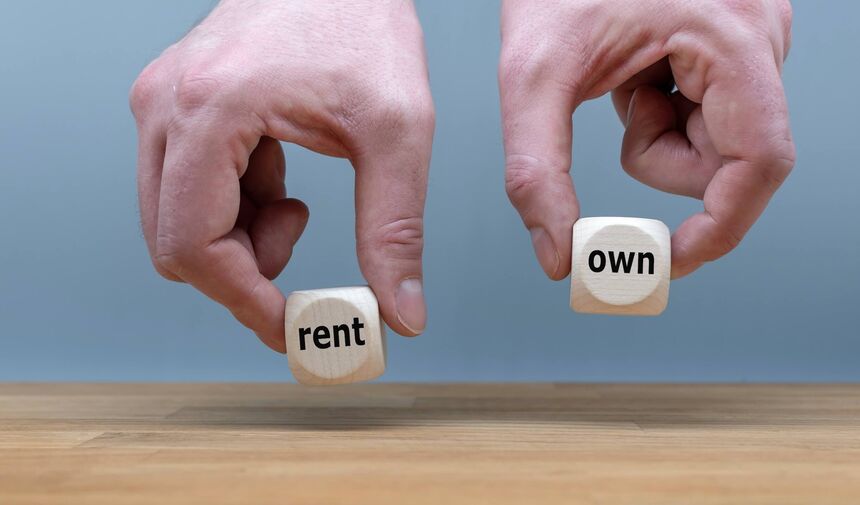 Manage your passwords wisely
Manage your passwords wiselyHowever, a home security system shouldn’t be something you buy without doing research ahead of time. There are tons of aspects to think about, including which alarm system is best for you and your family. Getting to know your home security and its benefits is one of the missions of Home-security.com.
But not all home security systems are the same. You might have noticed that some alarm systems are best for homeowners, while others aren’t great for renters. In this article, we’ll discuss the general guidelines for owners vs. renters. We will also provide a summary of the top home security companies that are better suited for your property, whether it is a large home or a small apartment.
Security systems
Without a doubt, investing in a home security system is one of the best ways to protect your family and home. No matter if you are a newbie or an experienced user thinking about upgrading your alarm system, educating yourself on the topic is the best way to start.
In recent years, home security has become more of a necessity than a luxury. Security systems have grown into a must-have innovation that many homeowners look to keep their home and family safe and secure. Understanding the different devices and their features will help you make the right choice when purchasing a security system.
Today, the odds of acquiring a home security system have immensely improved, thanks to security companies striving to deliver the best products. With a vast selection of affordable possibilities to choose from, home security is now a commodity within grasp by the average buyer.
But what is a home security system in the first place? Well, let’s start by defining a home security system as a network of electronic components running simultaneously to secure your home. The devices will activate the alarm when one sensor is triggered, like a door or a window opening.
Smart components such as motion sensors send instant messages to your smartphone when they detect movement in the desired monitored areas. Others, like security cameras, provide live feeds inside and out of your home, giving you an extra set of eyes to watch over your property.
Using home automation, you can control your security system from anywhere at any time. You can program your system to turn on the hallway lights, raise the blinds in the kitchen, and play your favorite tunes the moment you step into your home.
But before you run to the store and buy the latest voice-activated speakers to help you manage your alarm system, you must learn the basics. Security systems have two main ingredients: equipment and monitoring.
How the devices are set up and monitored will tell apart a DIY system from a professional one. In the following sections, you will learn the difference between them and hopefully help you figure out which one is the best fit for your property.
What is a DIY system?
Keeping an eye on your home with a security system doesn’t necessarily involve complex installations or steep monthly fees. The security industry created affordable Do-It-Yourself (DIY) systems for customers interested in straightforward setups they can take on by themselves.
DIY security systems come in all shapes and sizes and are not nearly as hard to set up as you might think. And even though you will be solely in charge of installing and running all the devices, it is generally a trouble-free process.
DIY equipment
The equipment comes with a simple plug-and-play configuration for easy setup. The devices are designed to be freestanding on any bookshelf or have peel-and-stick adhesives to place on flat surfaces.
DIY installations are perfect for customers who enjoy a hands-on project. But don’t worry, you won’t be completely alone throughout the entire process. Security companies offer how-to manuals and video tutorials on their website to guide you every step of the way. Some of them even have detailed instructions you can follow in the mobile app.
Mounting the system yourself will save you money from hiring a professional installer. Considering that you will be doing all the work, it eliminates the upfront costs many companies require for their equipment installations. It will also save you time since you won’t need to schedule an appointment and wait for them to arrive.
Nowadays, numerous home security companies offer preset equipment packages also intended for a simple setup. The packs usually come with a control panel or centralized Hub, motion detectors, and entry sensors so that you can start with the essential gear.
Most security companies grant the flexibility to customize your DIY system to your liking. You can start small and build your home security gradually, adding other smart devices over time. Environmental sensors, video doorbell cameras, and smart locks are some of the items that can make a massive impact on your security setup.
If you’re a newcomer into the home security universe, it’s always best to start small when starting a DIY home security project on your own. It will keep the costs low and help you figure out what devices are better, based on what you really need.
DIY Monitoring
After the setup is complete, it is time to move on to monitoring. Think carefully about how you would like to manage your alarm system. With self-monitoring (also called DIY monitoring), you are solely responsible for all aspects of your home’s protection. It is a huge undertaking that you should not take lightly.
Most DIY systems come with an app you can download to your smartphone or tablet. If you have an active Internet connection, you can oversee all installed devices from anywhere at any time.
Some companies offer complementary devices, like control panels and keypads for easy access around the home. But generally, the primary control will remain through the app. Some customers might not like to be app-dependent, as you will have to be mindful of your phone’s battery levels and Internet coverage.
When one of your sensors is triggered, you will receive instant notifications to your mobile phone. You are responsible for checking your home’s status and contacting the police or fire department if an emergency arises at home.
The main benefit of DIY systems is cost. You save money on installation fees and monitoring plans as you oversee the entire security operation. But this cost-effective route might not be for everyone.
Self-monitoring systems don’t have the same defense level as professional ones. There is no one else monitoring your home but you; No trained monitoring agents to contact the proper authorities on your behalf. If the system goes offline or you are unable to reach out, there won’t be anyone else to assist you.
DIY systems may seem like a time-consuming hassle, especially if you don’t have any technological experience. If you like, you can always ask a friend to help. The low cost that comes with DIYs can make up for all the trouble you could face.
But if you are still not comfortable handling a DIY system, you should look into a professional monitoring system.
What is a Professional system?
Traditional home security systems earned a poor reputation for delivering hard-to-handle equipment, convoluted contract requirements, and high monitoring costs. It deterred many potential new customers away.
Many security companies upgraded their systems, combining user-friendly equipment with competitive monitoring plans for a seamless venture into home safety. Nowadays, getting an alarm system is not as expensive as you might think.
We won’t deny that DIY systems are a more affordable approach to home security. Still, professional monitoring systems have their fair share of unique perks. They are a fantastic alternative for customers who want to be freed of the pressure of a DIY installation and monitoring experience.
Professionally installed systems
With a professional monitoring system, your involvement is minimal, aside from the requisite subscription. The security company will take care of everything, from installing all the equipment to monitoring your home 24/7.
Like DIYs, most professional monitoring systems come with a starter package that usually includes a hub or central panel, motion detectors, and entry sensors. You can also add other smart devices like smart lights, smart thermostats, and indoor/outdoor cameras for a more robust safety solution.
Some security companies demand a professional installation for all their gear for optimal placement and performance. A qualified expert will arrive at your place and set up all the devices. He will make sure they are installed correctly and running smoothly. And the best part: you won’t have to lift a finger!
Pro installations are the perfect option for the not so tech-savvy customers or don’t have the time to take on a DIY project. The main drawback: it comes at a higher cost. To help lower the financial impact on your wallet, some companies offer this service as an added cost that you can waver and install the equipment by yourself.
A professional installation can range from $50 and can go as high as $500 or over. It will depend on how many devices you ordered and your home’s size and layout. But don’t fret: some companies dilute all equipment and installation costs on the monthly fees to lessen the upfront expense.
Professionally monitored system
The main reason to pick a professional system is its outstanding monitoring service. Signing up for a professional monitoring plan will guarantee protection 24/7. When the alarm is triggered, the system will send instant notifications to the monitoring center, prompting them to act.
Trained monitoring agents will review your home’s status and contact the police or fire department on your behalf. If necessary, they will send a fast response team to your home. Having someone watching over your property around the clock can make a huge difference, especially if a crime is in progress or an urgent need for medical assistance.
Although the monitoring center will take over your home’s surveillance, it doesn’t stop you from accessing your alarm system. Security companies deliver smartphone apps so you can manage some cool home automation features.
Through home automation, you can create smart scenes that are out of this world. For example, you can program arm/disarm functions when you take off or come home from work or unlock the front door remotely to let the dog walker in. Some security systems even have a panic button for a family member with a debilitating health condition.
And as you might have guessed, everything comes with a cost. Even though home security systems are now more affordable than ever, they can still punch a sizable hole in your budget. Besides the monthly fees, you must think about some unforeseen “extra” charges.
Access to some home automation capabilities may have an additional cost unless you sign up for the more expensive plans. The same goes for cloud storage; Some companies charge extra fees for each security camera you install.
Plus, most professional systems come with lengthy contract agreements, accompanied by some steep cancelation fees. Many security companies also have moving fees, so that is why so important to know what you are getting into. Read the contract’s terms carefully so that you can choose the best plan for your needs.
Property owners vs renters
Whether you live in a six-bedroom home or a small studio apartment, you want the best security system to protect your family and your cherished possessions. But not all security systems work the same. Even though they have many components and features in common, security systems are not a one-size-fits-all kind of deal.
Owning a property or simply renting a place for a short term will weigh heavily on the best home security system for your needs. The property’s size and layout will also provide a different set of criteria to guide you to the perfect alarm system.
You must take time to investigate the best home security systems for homes and apartments. You will be able to make an educated decision on which security company is right for you.
Home-security.com has organized a list of features and the best home security systems for each property type. This way, you can make a final decision.
Property owners
As a property owner, you will have more wiggling room when selecting a home security system. You won’t have to worry about altering the property’s layout for a hardwired installation, drilling holes in the wall, or limited equipment packs.
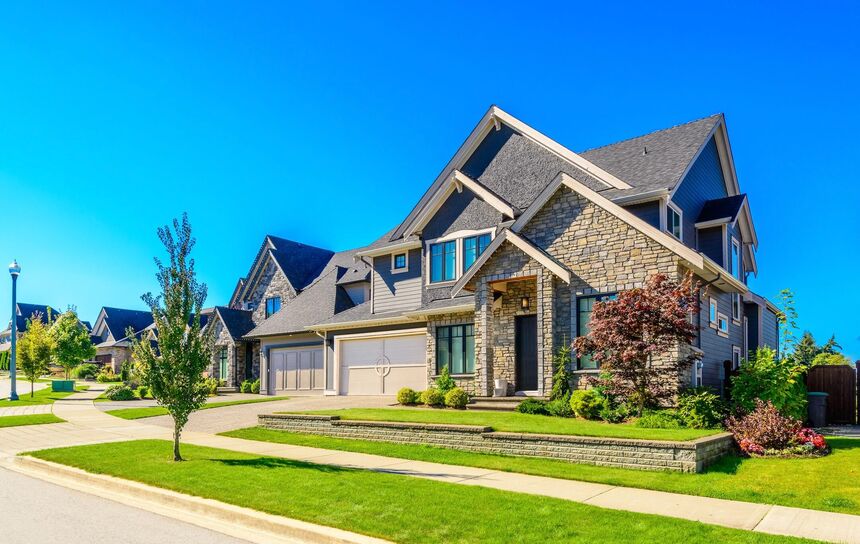 Home security for property owners
Home security for property ownersProperty owners should center their attention on how their property is laid out. Owning a large two-story home is not the same as a small apartment. But as an owner, you will have more a-la-carte buying options and features.
You can go for a DIY installation system or opt for a professional one, depending on your budget. Having a professional installation is the best option for larger homes since you will probably not move to a new location for a while. On the other hand, a more convenient approach for renters that move around a lot is a DIY setup.
A qualified technician has a better grasp of how your security system works, with installation and performance experience for more prominent properties. They can provide expert advice on what will work best for your property. And since you won’t be moving any time soon, the extra cost of a professional installation is worth every penny.
Most security systems are built for indoor use, so house owners should consider the outside of their property. You will probably need outdoor cameras and more entry sensors for the extra doors and windows. Also, adding smart lights for those blind spots is a great option to illuminate dark spaces.
As far as apartments go, it can swing either way. Given that an apartment’s square footage is usually smaller than a house, DIYs are an excellent choice. You don’t have so many entry points to monitor. Well, that is, if you don’t live in a first-floor unit with direct access to outside streets.
But not all customers are keen on taking on a DIY system. You might not have the time or are not too knowledgeable about smart devices. Hence, the option to go for a Pro installation is not entirely discarded. And since it will be a one-time deal, paying the extra bucks to have an expert setting up the alarm and explaining how everything works is a definite plus.
You will get the same unbeatable discounts that security companies give to long-term customers, regardless if it is for a house or an apartment. Besides, you might be interested in adding home automation features that only come when signing up for a professional monitoring system.
For example, some security cameras come with a limited or no cloud space, a key feature when reviewing footage. Most companies offer more storing space only when you subscribe to higher cost or premium plans. The same goes for home automation features: most of them are activated with the more expensive monitoring services.
If you are tech-savvy and don’t mind managing your home security, DIY is for you. But for larger family homes and apartment owners who want to guard their estates against property crimes or environmental hazards, having a professional monitoring system is a must.
Typically, when you subscribe to a professional monitoring service, environmental sensor monitoring is included. You have a safety net against nature’s destructive acts, like fires, floods, and extreme temperatures. It could save you loads of money by preventing expensive property damage.
Lengthy contract agreements won’t be an issue either (as long as you are not planning to move soon). Your forever home can have a more extended contract since you probably want to grow old at the same place. Signing up for longer-term contracts will lower your monitoring’s monthly rates and probably your homeowner’s insurance.
But don’t get overconfident with professional systems and extended contract agreements. Even if you are not planning on moving, sometimes life has a different plan. For most DIY systems, you just pack up and carry them with you, but you will probably have to pay a moving fee with professionally installed ones.
Some companies waive the moving fee if you have been an active customer for some time. But if you decide to cancel the contract altogether, most security companies have steep cancelation fees. Take your time and read the company’s agreement thoroughly, so you don’t get any unpleasant surprises.
A home security system can also save you money on your homeowner’s insurance. When you think about the cost of homeownership, you probably think only about the monthly mortgage payments. In addition to the mortgage, the real cost of owning a property involves many other expenses.
Property taxes, HOA and condo fees, and home maintenance are some of the most common expenses you will have to deal with as a property owner. Fixing the roof or repairing faulty wiring can be a significant expenditure. So, saving some bucks on insurance can go a long way.
Renters
If you are a renter, choosing a security system can be a little tricky. You might need to do more research to find the one that suits your particular situation. But first things first: contact your landlord and find out what his policy is regarding security systems.
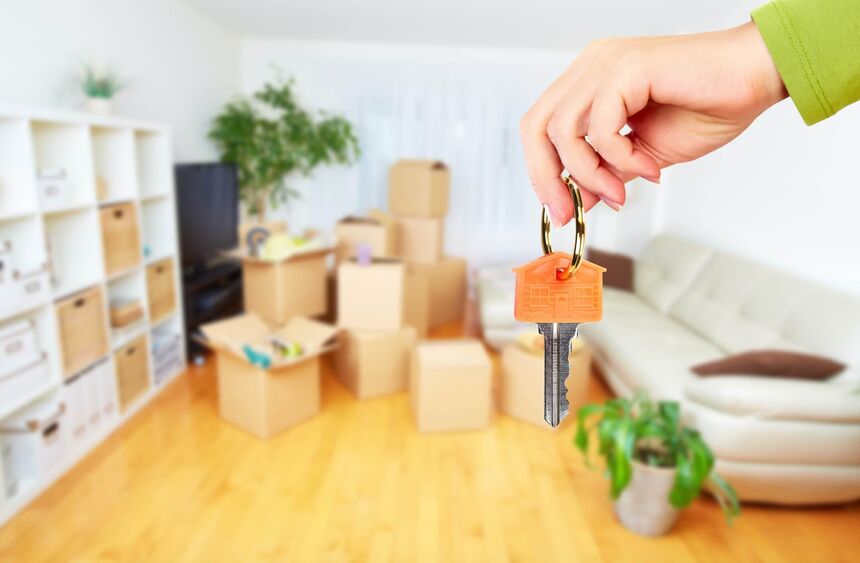 Home security for property renters
Home security for property rentersMost landlords would rather not have their renters drilling holes in the wall or install intricate security systems they have to take down later. Ask if you can install a wired security system or only allow wireless ones and if window decals are permitted on your screens.
You can purchase the latest home security system, but if it doesn’t suit your rental needs, it won’t do you much good. The good news is that you have plenty of options when shopping for rental properties.
Some of the best home security features for renters are wireless DIY installations with minimal equipment packages and on-demand buying options. Many security companies offer customizable equipment packs or have a-la-carte systems you can build from the ground up.
Wireless DIY systems are a tenants’ dream, no matter if it is for a home or an apartment. You can set up the equipment in a flash, without drilling holes or dangling wires hanging from your walls. What matters is coverage: Make sure you have enough sensors to protect your home.
Don’t go overboard buying all the latest smart devices on the market for a property you do not own. It is best to choose a preset equipment package that might be more economical. Then add specific smart devices tailored to your needs and take them with you if you move.
When exploring your rental’s security options, take a closer look at the smart product’s specific requirements. For example, choose a security camera that is portable and can be freestanding on any shelf. Pick one that can be managed through your smartphone app, without any contractual obligations or additional fees.
Video doorbell cameras might need special attention since some of them might involve a hardwire installation. New wiring, mounting brackets, or drilling holes on the doorframe might be some of the things you will have to do to install a video doorbell.
Remember, always ask your landlord for permission before you install anything. Maybe you can negotiate a deal and gradually take the camera’s cost off the rent and leave the equipment behind when you move out.
Your landlord might be interested in having those extra perks for his next tenant. Keep in mind that if you leave any security equipment behind, you need to take some anti-hacking precautions.
Don’t run off with your devices still logged into your account. Following some simple safety measures will help you prevent any future home security hacks. Starting fresh in a new home also means a fresh start for your security system.
The best part of a DIY system is its flexibility to be moved to a new site. With practically no tools involved, you can pack everything and move into a different location without having to pay steep installation or moving fees.
If you tend to move from one place to another quite frequently, you probably don’t want to be tied down by an alarm system. Choosing to self-monitor your security system might be the best option.
But suppose you want to bring on the heavy artillery and sign up for a professional monitoring system. In that case, many leading security companies provide outstanding service. It can turn into a predicament, considering that many security providers have 3-5-year contract agreements.
That doesn’t mean you can’t move your equipment from place to place; it just means that it is a little more complicated. Most security companies have relocation options but come with an added cost.
Extended contract agreements aren’t a total deal-breaker. If you are still passionate about professional systems and want the discounts that usually come with longer contracts, do your due diligence. Make sure you are aware of the company’s moving policies and fees.
Undoubtedly, home security systems with contract-free monitoring or short contracts are the ideal fit for most renters. Look for companies that accept month-to-month payments and don’t have steep cancelation fees.
What goes with what?
Ok, now that you know how security systems work and the difference between property owners and renters, we can move on to a more detailed look into security companies. It is time to decide which company meets your safety requirements and expectations.
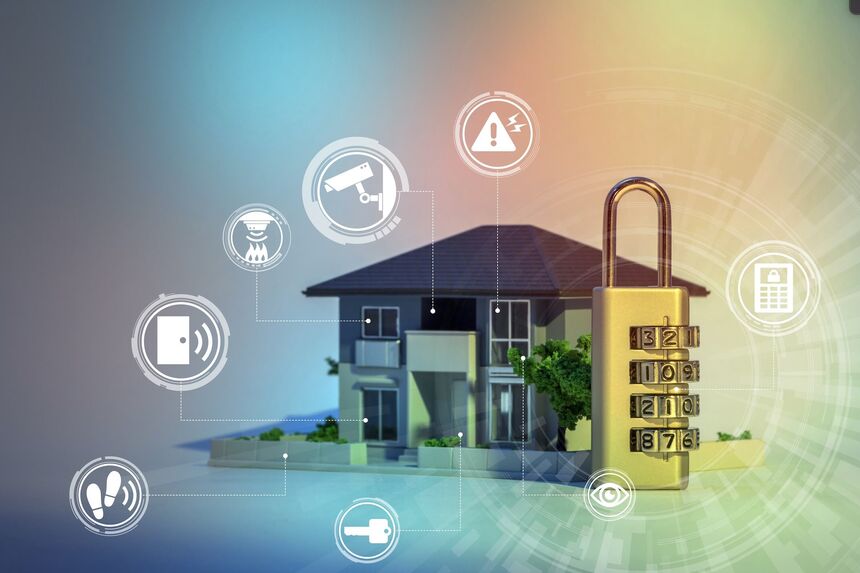 Choose wisely
Choose wiselyNowadays, home security companies offer state-of-the-art alarm systems and first-class monitoring services for you to cherry-pick. Here is a rundown of the leading home security companies and their main features, with our recommendations depending on the property type and needs.
| Security Company | DIY Installation | DIY Monitoring | Pro Installation | Pro Monitoring | Contract Length | Property Type | Best For |
|---|---|---|---|---|---|---|---|
| Abode | Yes | Yes | Optional | Yes | No contract | Apartments / Small homes | Owners / renters |
| Honeywell | Yes | Yes | No | No | No contract | All types of properties | Owners / renters |
| Nest | Yes | Yes | Optional | Optional | No contract | All types of properties | Owners / renters |
| Ring Alarm | Yes | Yes | Optional | Optional | No contract | All types of properties | Owners / renters |
| Scout | Yes | Yes | No | Yes | No contract | All types of properties | Owners / renters |
| SimpliSafe | Yes | Yes | Optional | Yes | No contract | All types of properties | Owners / renters |
| Link Interactive | Yes | Yes | No | Yes | Monthly / Yearly | All types of properties | Owners / renters |
| Brinks | Yes | No | Optional | Yes | 36 Months | All types of properties | Owners |
| Frontpoint | Yes | No | Optional | Yes | 36 Months | All types of properties | Owners |
| Protect America | Yes | No | Optional | Yes | 36 Months | All types of properties | Owners |
| Deep Sentinel | Yes | After 12 months | Optional | Yes | 12 Months | Homes | Owners |
| Xfinity Home | No | No | Yes | Yes | 24 Months | All types of properties | Owners |
| ADT | No | No | Yes | Yes | 36 Months | All types of properties | Owners |
| Vivint | No | No | Yes | Yes | 42 or 60 Months | All types of properties | Owners |
Bottom line
When you are thinking of buying a home security system, there are some vital elements you need to consider. The installation process, monitoring options, and contract agreements are the most vital ones. In this article, we evaluated which home security systems are the best match depending on your property type.
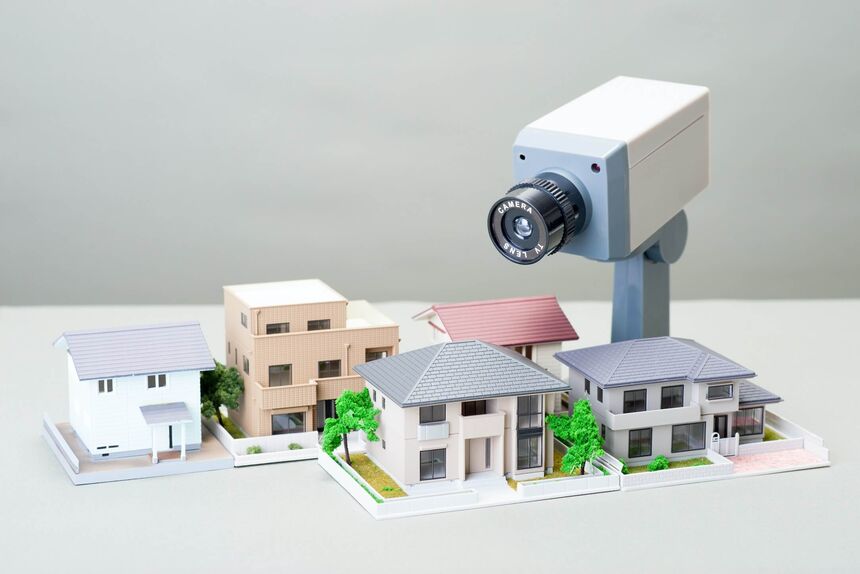 Home vs rent bottom line
Home vs rent bottom lineThe first decision you want to make is whether you want to go for a DIY system or a professional one. The equipment needed to protect your home is remarkably similar in capabilities, whether it is a DIY or a professional approach. The main difference is in how they are set up and cost.
One key feature you need to pay attention to is contract agreements. Property owners have more freedom when choosing a security system, as they won’t mind the more extended contracts . Property owners don’t move around as much as renters that have a limited lease.
Contract deals can limit the renter’s options since you don’t want your security contract to outlive your lease. It is best to read the fine print on any contract you are about to sign, so you are clear on the monthly, cancelation, and moving fees.
The type of home security system you need will rest upon the kind of property you live in and whether you own or rent:
• DIY systems are better suited for renters, vacation homes, and apartments thanks to their flexible equipment packs and no contract agreements. They can also work for smaller homes with a simple layout.
• Professional systems are more fit for homeowners with bigger properties and who are in for the long run. The contract agreement will be the determining factor. Owning your property will open up loads of options, whether it is a DIY or Pro security system.
But not all home security systems are created equal, in the sense that some are better equipped for homes while others are perfect for apartments. Hopefully, by now, you can tell the difference between them and make an informed decision.
No matter what type of customer you are, one thing is undeniable: home security systems deliver the peace of mind you are looking for.
 Menu
Menu